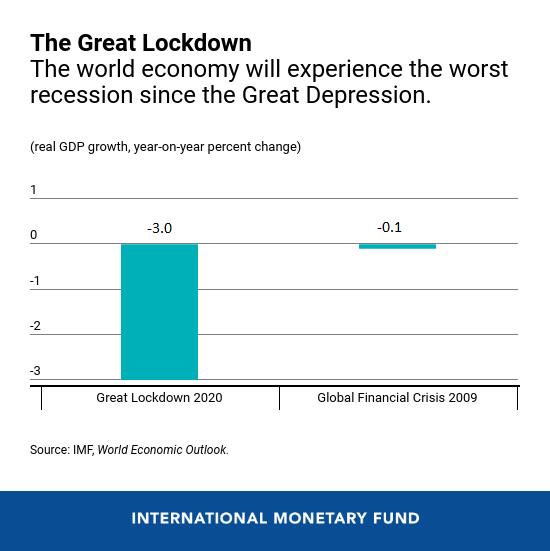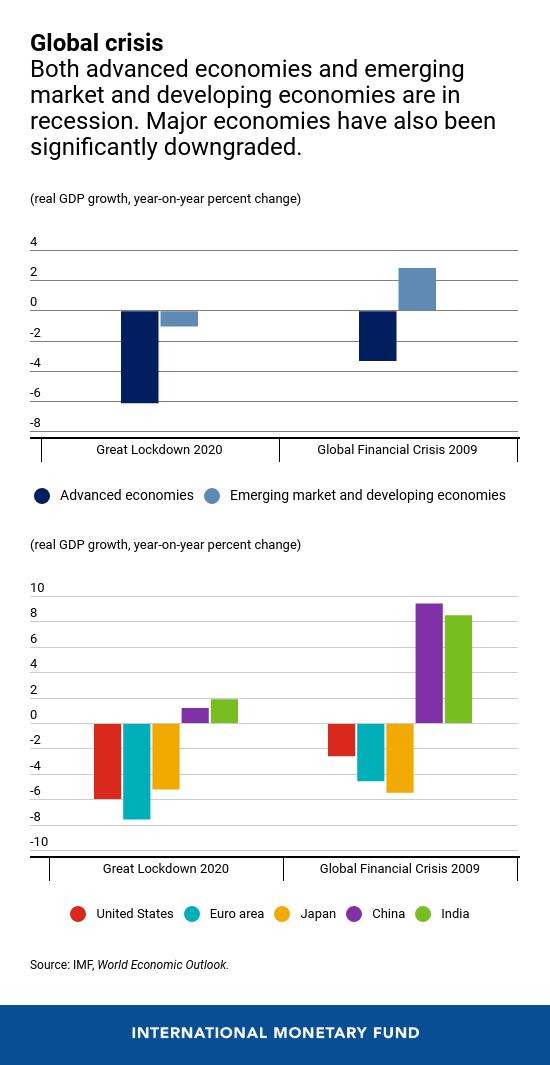The International Monetary Fund (IMF) have, in their latest projections, estimated that Malta's GDP will fall by 2.8% as a result of the spread of Covid-19 - the lowest drop across Europe - and then rise again by 7% in 2021 as the world's economy stages a bounce-back from the effects of the virus.
In its most recent World Economic Outlook, issued on Tuesday, the IMF estimated that the global economy will contract by 3% as a result of the spread of Covid-19 - a staggering 30 times worse than the global economic contraction in the last global recession in 2009.
However, they also estimated that if the pandemic fades in the second half of 2020 and containment efforts are slowly unwound, the global economy is projected to grow by 5.8% in 2021.
In Malta's case the IMF said that the country's GDP is projected to decline by 2.8% in 2020 - which is the lowest out of any country in Europe. It also projects unemployment to increase from 3.4% in 2019 to 5% in 2020, and then decrease again to 4.4% in 2021.
The IMF projected that Euro Area will face a 7.5% downturn in its GDP in 2020. San Marino is expected to be the hardest hit European economy with a 12.2% contraction, followed by Greece (10%), Italy (9.1%), Croatia (9%), Latvia (8.6%), Lithuania (8.1%), and Spain and Portugal (both 8%).
Other major European economies such as France (7.2%), Germany (7%), and the United Kingdom (6.5%) are all projected to suffer significant declines as well.

"The COVID-19 pandemic is inflicting high and rising human costs worldwide. Protecting lives and allowing health care systems to cope have required isolation, lockdowns, and widespread closures to slow the spread of the virus. The health crisis is therefore having a severe impact on economic activity", the IMF wrote in the executive summary of its latest World Economic Outlook.
"As a result of the pandemic, the global economy is projected to contract sharply by -3 percent in 2020, much worse than during the 2008-09 financial crisis", they concluded.
On a global scale, the United States is expected to see a contraction of 5.9%, Canada is expected to see a decrease of 6.2%, while Japan is expected to see a decrease of 5.2%. Russia too will likely see a decline of around 5.5% as per these estimations, while Latin America and the Caribbean will also be hard hit with a decrease of 5.2%.
China - the place where the virus was first found - meanwhile will still actually see its GDP continue to grow by 1.2% - although this is a far cry from the 5.5% growth it experienced in 2019. The same can be said of India: they are estimated to experience a growth of 1.9%.

Explaining the significance of the analysis, the IMF's Chief Economist Gita Gopinath said that assuming the pandemic fades in the second half of 2020 and that policy actions taken around the world are effective in preventing widespread firm bankruptcies, extended job losses, and system-wide financial strains, they project global growth in 2021 to rebound to 5.8%.
The economy in the Euro Area is then expected to bounce back in 2021 and grow by 4.5% on average, with Malta's recovery projected to be of 7% in terms of its GDP - amongst the higher in Europe. Only the three Baltic nations (Estonia, Lithuania, and Latvia), Serbia and the Czech Republic are projected to have a higher recovery in its GDP in Europe.
"This recovery in 2021 is only partial as the level of economic activity is projected to remain below the level we had projected for 2021, before the virus hit. The cumulative loss to global GDP over 2020 and 2021 from the pandemic crisis could be around 9 trillion dollars, greater than the economies of Japan and Germany, combined", she wrote.
She said that this is the baseline scenario but that given the extreme uncertainty surrounding the crisis, there are other scenarios which are possible.
"The pandemic may not recede in the second half of this year, leading to longer durations of containment, worsening financial conditions, and further breakdowns of global supply chains", she wrote.
"In such cases, global GDP would fall even further: an additional 3% in 2020 if the pandemic is more protracted this year, while, if the pandemic continues into 2021, it may fall next year by an additional 8% compared to our baseline scenario."
The IMF praised actions of large central banks in recent weeks to include monetary stimulus and liquidity facilities to reduce systemic stress.
"These actions have supported confidence and contribute to limiting the amplification of the shock, thus ensuring that the economy is better placed to recover", they said.
They urged banks to renegotiate loans to distressed households and firms while maintaining a transparent assessment of credit risk.
"Strong multilateral cooperation is essential to overcome the effects of the pandemic, including to help financially constrained countries facing twin health and funding shocks, and for channeling aid to countries with weak health care systems", they said.
"Countries urgently need to work together to slow the spread of the virus and to develop a vaccine and therapies to counter the disease. Until such medical interventions become available, no country is safe from the pandemic (including a recurrence after the initial wave subsides) as long as transmission occurs elsewhere", the IMF concluded.
Economy Ministry statement
The Economy Ministry, in a statement, said that the prediction that Malta's GDP will fall by 2.8% is far less than the predicted Euro Zone's 7.5% fall.
The ministry also said that Malta's unemployment, which will rise to 5% in 2020, is far less than the 7.3% unemployment the country had in the 2009 economic crisis.
In terms of inflation, Malta's rate is expected, by the IMF, to drop to 0.6%, the ministry said. This expected rate is two percentage points less than the average inflation rate under the previous administration, the ministry added.
The ministry also acknowledged the prediction that Malta's economy will grow by 7% in 2021, while adding that the rest of Europe's economies are expected to grow by under 5% on average.
Economy Minister Silvio Schembri said that over the past weeks, "the work to introduce economic support measures for businesses and self-employed shows that despite the pressure and problems brought about by the pandemic, the government continued functioning well, and was capable of reaching a social pact through which we can beat the biggest economic challenge our country has faced."
He said that Malta has one of the best economic stimulus packages in the world.